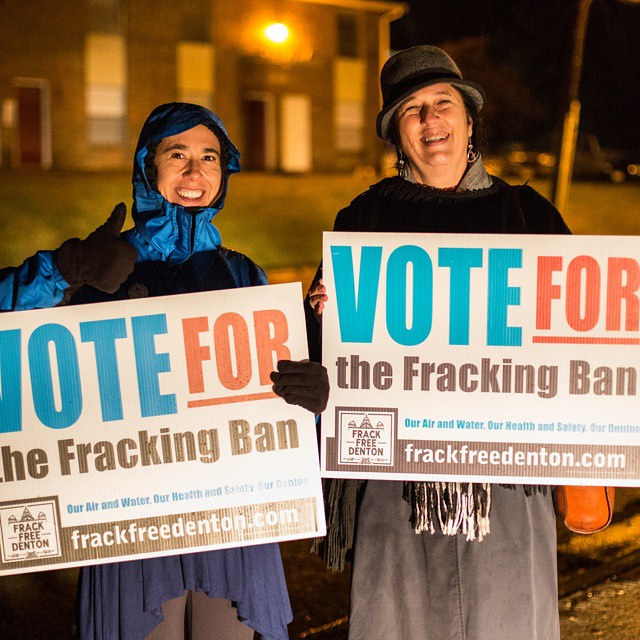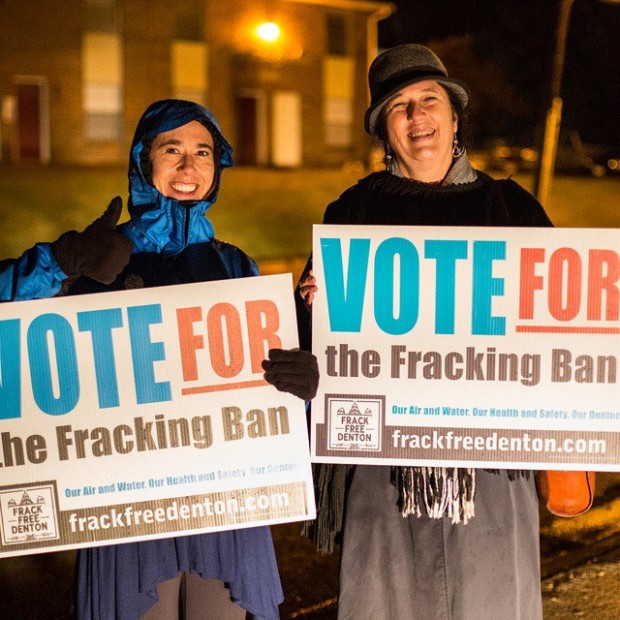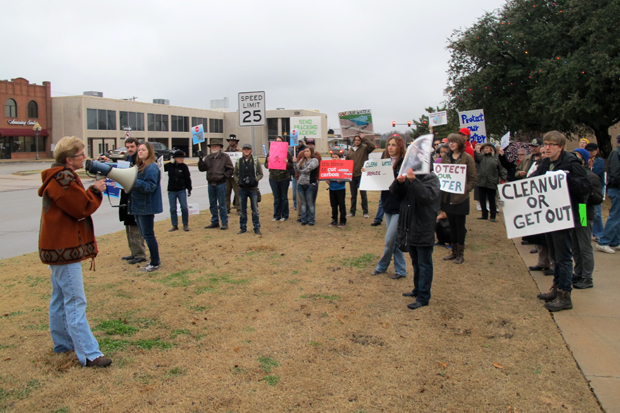
Volunteers watching the polls in November 2014 in Denton, Texas, before voters approved a citywide ban on hydraulic fracturing.
Photomancer / Flickr


Volunteers watching the polls in November 2014 in Denton, Texas, before voters approved a citywide ban on hydraulic fracturing.
Photomancer / Flickr

Photomancer / Flickr
Volunteers watching the polls in November 2014 in Denton, Texas, before voters approved a citywide ban on hydraulic fracturing.
As legislation written to prevent counties and municipalities from banning hydraulic fracturing and other oil and gas activities advances through the Oklahoma House and Senate, some city leaders and their advocates say the measures go too far and could have unintended consequences.
Oklahoma lawmakers have filed at least eight bills that would prohibit municipal or county bans — or effective bans — on oil and gas drilling, production and related activities like hydraulic fracturing, or fracking. The legislation differs in the details, but the motivation is the same.
“A fracking ban is a drilling ban,” House Speaker Jeff Hickman said on the House floor during the March 16 session.
The Republican from Fairview authored one of the anti-frack ban bills — House Bill 2178 — which, like the other legislative efforts, was inspired by the fracking ban enacted in the city of Denton, Texas.
“It’s been a real mess in Texas,” Hickman told fellow lawmakers.
During the November 2014 election, about 59 percent of Denton voters — roughly 15,000 residents — marked their ballots to pass a referendum banning fracking within the city limits.
Denton’s fracking ban touched off legal and legislative challenges in Texas and spooked oil industry supporters north of the border in Oklahoma, where Hickman and other top lawmakers vowed to head off problems before they started.
Lawmakers in Oklahoma worry that anti-fracking enthusiasm could take root in college towns like Stillwater and Norman, where there have been calls for tougher oil and gas rules, as well as demonstrations about pipelines.
Norman Mayor Cindy Rosenthal says city officials have been revising outdated oil and gas ordinances — updates, she says, that address issues such as fencing, insurance and setbacks.
“Our end goal really is to provide for the health, public safety and welfare of our community,” she says.
Hickman and the authors of anti-frack ban legislation say their bills preserve this authority.
“By passing this law, we’re giving the authority on traffic, noise, odors, setbacks — all of that to municipalities or counties,” Hickman said on the House floor.
Hickman didn’t grant StateImpact’s requests for an interview, but Senate President Pro Tempore Brian Bingman did. The Republican and ranking state senator is a co-sponsor of the speaker’s bill and has authored his own anti-frack ban legislation — Senate Bill 809.
”If cities were allowed to ban, it would be very burdensome on the business,” Bingman says. “It would also affect mineral owners.”
Oil companies, the State Chamber and the Coalition of Oklahoma Surface and Mineral Owners are pushing for the legislation. Those groups say oil production techniques like fracking are essential to unlocking lucrative oil and gas deposits from shale rock.
Bingman says oil and natural gas are property, and it’s the state’s responsibility to protect the rights — and methods — needed to access that property.
“This bill preempts any local community on the banning oil and gas drilling within their communities,” Bingman says. “It does allow them to continue with reasonable rules and regulations.”

Logan Layden / StateImpact Oklahoma
Demonstrators outside the Norman City Hall before a city council committee met to discuss changes to oil and gas drilling rules.
“Reasonable” is a term used in the language of the proposed legislation and related discussions about anti-frack ban legislation, but city officials and lawmakers alike have suggested the ambiguous word could prove problematic.
“Obviously, we have a substantial difference between what citizens would consider reasonable versus what oil and gas would consider reasonable,” Williams said to Speaker Hickman during debate on the House floor.
Stillwater city councilor Gina Noble raised similar concerns in a February interview with StateImpact. Norman Mayor Rosenthal says the vagueness is “problematic.”
“Reasonableness is in the eye of the beholder,” she says.
Local officials are also worried about language specific to Senate versions of the anti-frack ban legislation — including Hickman’s SB 809 and SB 468, authored by Sen. Bryce Marlatt, R-Woodward — that lowers the threshold of an oil and gas “taking,” a term describing government seizure of property for public use.
Any municipal or county action that “substantially” increases the costs of oil and gas operations or reduces the market value of oil and gas deposits “shall be considered a taking,” according to the language of SB 809.
“A lot of alarm bells went off when takings were mentioned,” says Carolyn Stager, executive director of the Oklahoma Municipal League, a nonprofit group that advocates on behalf of local governments.
Rosenthal is most alarmed by a word that’s not used in leading anti-frack ban legislation: water. The bills don’t give cities, towns and counties the authority to pass oil-drilling rules that protect water and water supplies like Norman’s Lake Thunderbird.
“You’re talking about 175,000 people who depend on that water supply, and the increasing number of oil and gas wells being drilled in that area are cause for concern,” Rosenthal says.
The 2015 legislative session is ongoing, and municipal officials and their advocates are optimistic they will have some role in shaping the final language of anti-frack ban legislation.
Rosenthal says Norman isn’t considering a ban on fracking, and a ban is not something she would ever push for personally. But she’s concerned that the legislation — or a court’s interpretation of the legislation — could block a lot more than local bans on fracking.